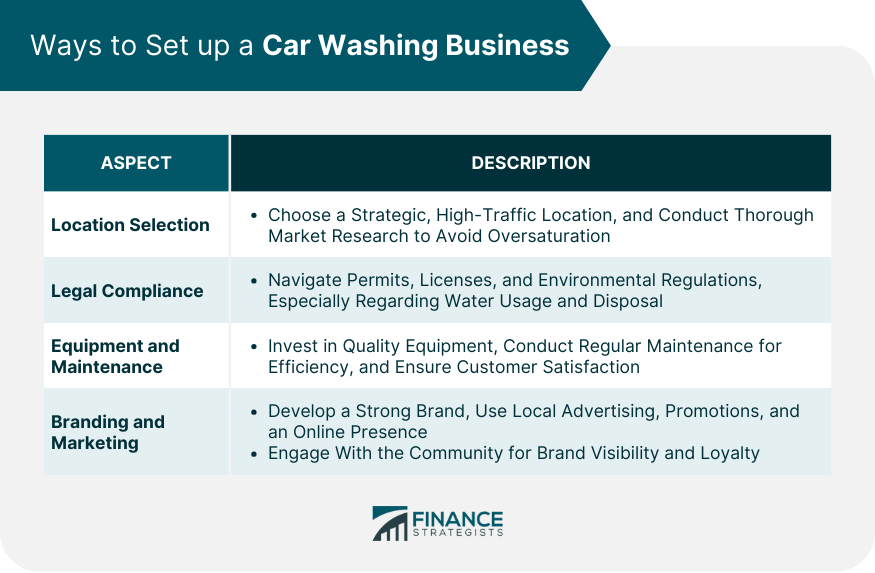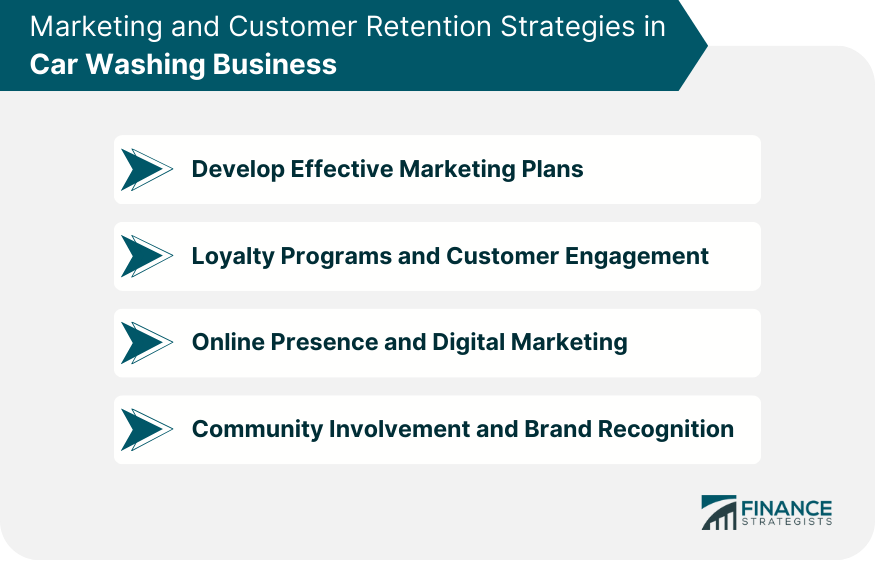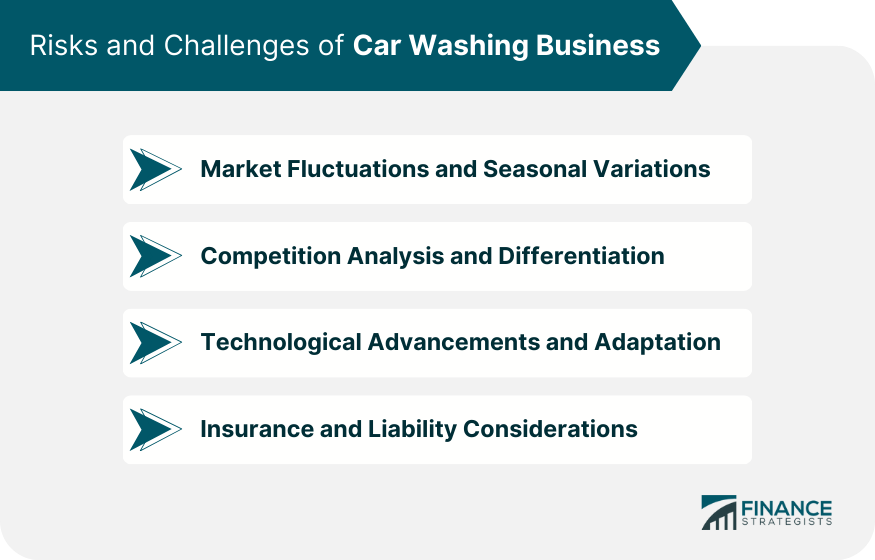Passive income is like a dream for many people because it lets you earn money without having to work every day. One good way to make passive income is by starting a car wash business. This is a great idea because everyone needs to keep their cars clean. So, you can make a steady amount of money from this need. In the car wash business, being creative and giving great customer service is very important. They help make the business successful and profitable, especially if you prefer not to be involved in the day-to-day operations. The good thing about a car wash business is that you can grow it, and there are always customers. Cars are everywhere, and they always need to be cleaned, which means you'll always have people who need your service. Also, you can choose how you want to run your car wash. You can either use advanced automatic systems that don't need much human help, or you can go for more hands-on methods. It depends on how much you want to be involved in the business. Selecting the right location is a critical step in establishing a successful car washing business. The ideal spot balances visibility, accessibility, and traffic flow. High-traffic areas near shopping centers or main roads often guarantee a regular flow of potential customers. However, it's essential to conduct thorough market research to ensure the area isn't already saturated with similar services. A strategic location not only increases visibility but also adds convenience for customers, a key factor in building a loyal client base. Navigating the legal and regulatory landscape is crucial for any business, and car washing is no exception. This involves acquiring the necessary permits and licenses, which vary depending on the location and the nature of the services provided. Additionally, compliance with environmental regulations, particularly regarding water usage and disposal, plays a significant role. Understanding and adhering to these legal requirements from the outset can prevent costly fines and disruptions in the future. Investing in quality equipment is fundamental for a car washing business. This ranges from basic tools like hoses and brushes for a manual setup to more sophisticated, automated machinery for a fully automated car wash. The choice of equipment impacts not only the efficiency of the operation but also the quality of the service. Regular maintenance of this equipment is equally important to ensure uninterrupted service and customer satisfaction. Creating a strong brand and effective marketing strategy is vital in distinguishing your car wash from competitors. This involves developing a recognizable brand identity, including a memorable name and logo. Effective marketing strategies might include local advertising, offering promotions or loyalty programs, and maintaining a robust online presence. Engaging with the community through social media and local events can also enhance brand visibility and customer loyalty. Starting a car washing business requires a significant initial investment. This includes the costs of acquiring land or leasing a property, purchasing equipment, and covering operational expenses like utilities and staff salaries. The scale of the investment largely depends on the type of car wash (manual, automated, or a combination) and the desired level of technology and automation. A detailed financial plan is crucial to secure funding, whether through loans, investors, or personal savings and to manage these initial costs effectively. The primary revenue for a car washing business comes from the basic service of washing vehicles. However, diversifying services can substantially increase income. This can include offering different wash packages, detailing services, and even ancillary products like car fresheners or windshield wipers. Seasonal promotions and loyalty programs can also boost revenue, encouraging repeat business and attracting new customers. Understanding and managing operational costs is essential for the financial health of the car wash. These costs include utilities (especially water and electricity), cleaning supplies, equipment maintenance, and staff wages. Keeping a close eye on these expenses helps in setting competitive yet profitable pricing. Additionally, implementing energy-efficient solutions and water recycling systems can significantly reduce long-term operational costs. Conducting a break-even analysis helps in understanding when the business will start making a profit. This involves calculating the point at which total revenues equal total costs, indicating that all initial investments have been recouped. Future profit projections are also vital for long-term planning and can assist in making informed decisions about reinvestments, expansions, or improvements to the business. Automated car wash systems come in various forms, such as tunnel washes, in-bay automatics, and touchless systems. Each type offers different levels of efficiency, customer satisfaction, and cost. Tunnel washes, for instance, are capable of handling high volumes of cars efficiently, making them ideal for busy locations. Touchless systems, while more expensive, appeal to customers concerned about potential damage to their vehicles. The primary advantage of automation in car washing is the reduction in labor costs and the ability to operate continuously without significant downtime. Automated systems also tend to be faster and more consistent in quality, enhancing customer satisfaction. This increased efficiency can lead to higher throughput, boosting revenue potential. Additionally, automated systems can often be remotely monitored and managed, enhancing the passive nature of the income. While automation offers many benefits, it also presents challenges. The initial investment in automated equipment can be substantial. There is also the need for regular maintenance and upgrades to ensure reliability and efficiency. Furthermore, automated systems might not cater to all customer preferences, especially those who prefer the attention to detail that comes with manual washing. Balancing automation with customer expectations is crucial for success. Conducting a cost-benefit analysis helps in determining the most suitable operational model for your car wash. This analysis should consider the initial and ongoing costs of automated equipment against the potential revenue increase and labor cost savings. It should also factor in the target market's preferences – whether they value speed and convenience over the bespoke service of a manual wash. A robust marketing plan is critical in attracting and retaining customers in a car wash business. This involves identifying the target market and tailoring marketing efforts to reach this audience effectively. Strategies might include local advertising, online marketing through social media and search engine optimization, and community engagement activities. Offering promotions, discounts, or value-added services can also draw in customers and give an edge over competitors. Implementing loyalty programs is a proven strategy to encourage repeat business. These programs can offer rewards, discounts, or exclusive services to frequent customers. Engaging with customers through feedback and personalized services enhances their experience, leading to increased satisfaction and word-of-mouth promotion. Active engagement on social media and prompt responses to customer inquiries and reviews are also essential in building a loyal customer base. In today's digital age, having a strong online presence is indispensable. A well-designed website, active social media profiles, and positive online reviews can significantly impact customer perception and decision-making. Utilizing digital marketing tools like Google Ads, Facebook advertising, and email newsletters can effectively reach a broader audience. Online booking systems and service inquiries can also add convenience for customers, further enhancing their experience. Engaging with the local community can significantly enhance brand recognition. This might involve sponsoring local events, participating in community service, or collaborating with other local businesses. Such involvement not only boosts the business’s profile but also fosters a positive public image, aiding in building a loyal customer base in the community. As the business grows, hiring and effectively managing staff becomes crucial. This includes recruiting skilled employees, providing training, and establishing clear communication channels. Implementing efficient workflow processes and maintaining a positive work environment is key to ensuring high-quality service. Regular staff meetings and feedback sessions can also help identify areas of improvement and encourage employee engagement. Maintaining high standards of quality and customer service is essential for the long-term success of the business. This involves regular monitoring and maintenance of equipment, ensuring cleanliness and safety standards, and providing excellent customer service. Addressing customer complaints promptly and efficiently can also significantly enhance customer satisfaction and loyalty. Expanding the business can take several forms, such as opening new locations, franchising, or diversifying services. Each expansion strategy requires careful planning, market research, and financial analysis to ensure its feasibility and potential for success. Understanding the business’s strengths and market demand can guide decisions on the most effective way to grow. Offering additional services such as detailing, paint protection, or interior cleaning can attract a broader range of customers and increase revenue streams. These services can be tailored to meet specific market demands and preferences, providing a competitive edge. However, diversifying services also requires additional skills, equipment, and marketing efforts. The car wash business, like many others, is susceptible to market fluctuations and seasonal variations. Demand for car washing services can vary depending on weather conditions and economic factors. Preparing for these fluctuations through flexible business strategies and diversified service offerings can help mitigate these risks. Understanding and responding to competition is crucial in the car wash industry. This involves analyzing competitor services, pricing, and marketing strategies. Differentiating the business through unique services, superior customer experience, or technological innovations can provide a competitive advantage. Keeping abreast of industry trends and customer preferences is also vital in staying ahead of competitors. The car washing industry is continuously evolving with new technologies and methods. Staying updated with these advancements and adapting accordingly is essential for maintaining efficiency and competitiveness. Investing in new technology can be costly but may offer long-term benefits in terms of operational efficiency and customer satisfaction. Insurance is a critical aspect of managing risks in a car wash business. This includes coverage for property damage, equipment failure, and liability in case of accidents or injuries. Understanding and securing the appropriate insurance coverage ensures protection against unforeseen events and financial stability. Starting a car wash business is a promising avenue for generating passive income, leveraging the perpetual need for vehicle maintenance. Key to success in this venture are factors like selecting a strategic location, navigating legal requirements, investing in quality equipment, and developing strong branding and marketing strategies. Financial planning, including managing initial investments and operational costs, is vital for sustainability. Embracing automation can enhance efficiency and profitability, although it's important to balance it with customer preferences. Robust marketing and customer retention strategies, including digital presence and community involvement, play a crucial role in building a loyal customer base. As the business grows, focusing on quality control, staff management, and thoughtful expansion strategies is essential. Despite the challenges of market fluctuations and competition, staying adaptable and responsive to industry trends can lead to long-term success and a steady source of income.Passive Income and Car Washing Overview
Setting up a Car Washing Business
Location Analysis and Selection
Legal and Regulatory Considerations
Equipment and Supply Requirements
Branding and Marketing Strategies

Financial Planning and Analysis
Initial Investment and Capital Requirements
Revenue Streams in Car Washing
Cost Analysis
Break-Even Analysis and Profit Projections
Implementing Automation in Car Washing
Types of Automated Car Washing Systems
Advantages of Automation for Passive Income
Challenges and Considerations in Automation
Cost-Benefit Analysis of Automated vs Manual Operations
Marketing and Customer Retention Strategies in Car Washing Business
Developing Effective Marketing Plans
Loyalty Programs and Customer Engagement
Online Presence and Digital Marketing
Community Involvement and Brand Recognition

Managing and Scaling the Business of Car Washing
Hiring and Management of Staff
Quality Control and Customer Service Excellence
Expansion Strategies
Diversifying Services
Risks and Challenges of Car Washing Business
Market Fluctuations and Seasonal Variations
Competition Analysis and Differentiation
Technological Advancements and Adaptation
Insurance and Liability Considerations

Final Thoughts
Passive Income Through Car Washing FAQs
When selecting a location for a car wash, it's important to consider factors like high visibility, easy accessibility, and strong traffic flow. Ideal locations are often near shopping centers or busy roads. Conducting market research is essential to ensure the area isn't oversaturated with similar services.
Starting a car wash business requires a substantial initial investment. This covers costs such as acquiring or leasing land, purchasing equipment (which varies based on the type of car wash), and covering operational expenses like utilities and staff salaries. The scale of investment depends on the chosen business model and technology level.
Automation in car washing reduces labor costs and allows for continuous operation with minimal downtime. Automated systems are typically faster and offer more consistent quality, enhancing customer satisfaction and increasing throughput. Additionally, they can be remotely monitored, contributing to the passive nature of the income.
Effective strategies for attracting and retaining customers include developing a strong brand identity, implementing robust marketing plans (both online and local), engaging with the community, and maintaining an active online presence. Implementing loyalty programs and offering exceptional customer service are also key to building a loyal customer base.
Key challenges include adapting to market fluctuations and seasonal variations, navigating competition, keeping up with technological advancements, and managing insurance and liability risks. These can be mitigated through flexible business strategies, differentiating services, staying updated with industry trends, and ensuring proper insurance coverage.
True Tamplin is a published author, public speaker, CEO of UpDigital, and founder of Finance Strategists.
True is a Certified Educator in Personal Finance (CEPF®), author of The Handy Financial Ratios Guide, a member of the Society for Advancing Business Editing and Writing, contributes to his financial education site, Finance Strategists, and has spoken to various financial communities such as the CFA Institute, as well as university students like his Alma mater, Biola University, where he received a bachelor of science in business and data analytics.
To learn more about True, visit his personal website or view his author profiles on Amazon, Nasdaq and Forbes.











